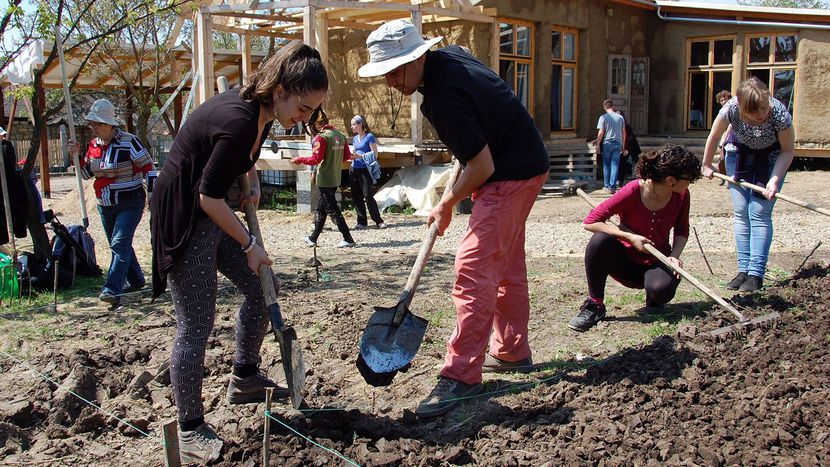
Welcome to Eco-Village Moldova: sustainable lifestyle and community building in the Republic of Moldova
Published on
Sustainable lifestyle based on local resources, contiguous and accessible educational programs, community building with openness and welcoming atmosphere: these are the main elements of Eco-Village Moldova.
Sustainable lifestyle based on local resources, contiguous and accessible educational programs, community building with openness and welcoming atmosphere: these are the main elements of Eco-Village Moldova. Established by a diverse group of people, the project is based on the founders’ common desire to strive for a more ecological lifestyle and live in a community, the members of which share the same values and principles. Their vision started to take a material shape in 2014 when the group decided to settle down and build up their new home in a northern village of Moldova, Rîşcova.
Taking the road from Chisinau, the capital city of the Republic of Moldova, it takes forty minutes to get to Rîşcova by the minibus. Located in an appealing landscape, the village shows the familiar image of the rural countryside: neat family houses with vegetable gardens, some of them surrounded by fences decorated with colorful images of fruits, animals and geometric figures. Near the houses different kind of domestic animals ramble on the dirt roads of the village. It lasted the group one year to find the suitable location of Eco-Village Moldova, and Rîşcova won the competition over twenty rivals. Important factors were that most of the inhabitants are living partly or entirely from agriculture, and the neighborhood of the village is rich in natural materials such as reed and straw-bale. Beside the natural facilities of the place and its closeness to the capital, the openness, curiosity and supportive attitude of the village’s community were the most convincing for the group.
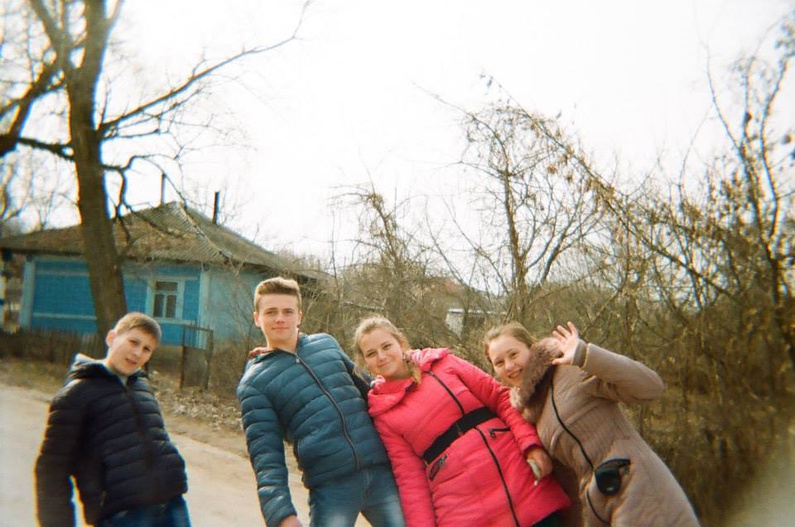 Interdependence is the new independence
Interdependence is the new independence
‘It was important for us to be part of an existing community and not to be somewhere in the middle of a forest or a field’ – says Liliana Botnaru, one of the founders, talking about the beginnings. The idea of Eco-Village Moldova was born during a series of meetings and discussions about sustainable lifestyle more than three years ago. While some of the participating families were craving for a place further away from civilization, where they can create an independent and self-sustainable community, the founders of Eco-Village Moldova were more interested in living in interdependence with an existing community. From their point of view, living in interdependence does not only mean to share local materials and resources with inhabitants of the village, but also to exchange knowledge and ideas, to learn from the experiences of the village’s community as well as to give them back something through trainings and youth activities.
When the group decided to continue working in a more structured way and register as an NGO, they found EcoVisio, an initiative founded in 1999, engaged in supporting ecological and educational development projects. As the name of EcoVisio indicates, the local organization aims to connect and support people who want to work on a common vision for Moldova, especially in the field of ecological agriculture, urban and rural development, energy efficiency and awareness in using natural resources. The own vision of EcoVisio is based on the fact that Moldova has good facilities for agriculture, and the conscious and efficient use of these natural resources could help to improve the country’s economy and provide better living standards for its citizens. The objectives of the group fit well in the mission of EcoVisio. Since they also shared common principles, they decided to unite their efforts and EcoVisio adapted Eco-Village Moldova as one of its own independent projects.
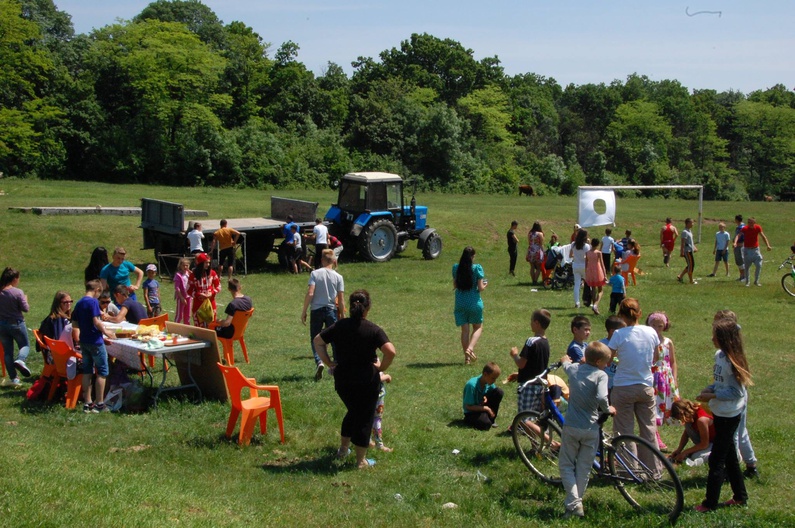 Getting integrated in Rîşcova
Getting integrated in Rîşcova
The group started to put the idea of interdependence in practice as soon as they arrived at Rîşcova. It was important for them as newcomers to get to know the inhabitants of the village better as well as to let them know about their plans and try to involve them in their activities. ‘At the beginning we had two big community events. The first was a clean-up in the area, and on the second occasion we were planting walnut trees on a piece of a kind of abandoned land at the border of the village. The young people, who participated in those actions, were keen on learning about environment, so we asked them if they would be interested in joining to an eco-club’ – remembers Liliana.
Forming an eco-club was one of the first steps the group took to get integrated in the local community, and it soon proved to be a good decision. ‘We started weekly meetings with youngsters between the age of fourteen and sixteen and we had around fifteen participants who were coming pretty regularly. We learnt about environment and how this knowledge is applicable in their life, and we also had some sessions on project planning and design’ tells Liliana, adding that during the sessions the group tried to underline the importance of combining theory with practice. Their young participants became enthusiastic to do something in their village, insomuch that they proposed for the next community event to clean up the central area of the village and organize a workshop to build furniture for the future park using recycled materials. The event was not just a good starting point to create a community space in Rîşcova, but it also helped the group to win the trust and sympathy of the village’s community showing the motivation of the younger generation.
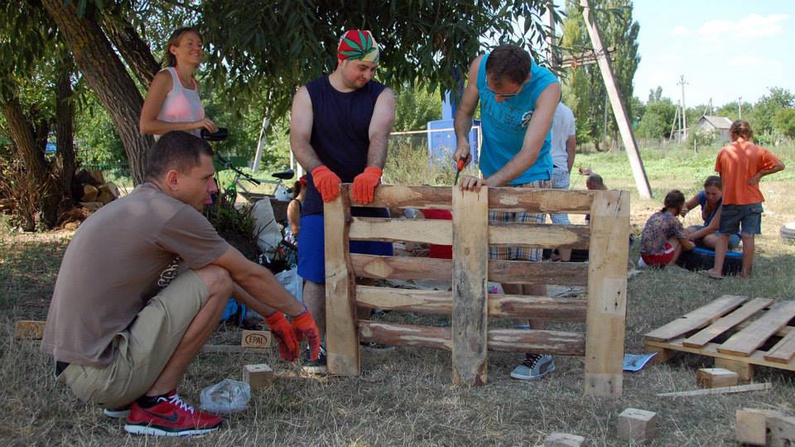 Community development was the other important element of interdependence the group started to work on from the very beginning. Instead of inviting specialists from other villages, they decided to train the locals and involve them in the construction of Eco-Village Moldova. During trainings they learnt how to work with natural materials such as clay, straw-bale or reed and build simple, but healthier and more environmentally friendly houses using the right techniques and proportions of the materials. Although some of the inhabitants were skeptical at the beginning, the result resolved their doubts and they started to adapt the learnt practices in their own households.
Community development was the other important element of interdependence the group started to work on from the very beginning. Instead of inviting specialists from other villages, they decided to train the locals and involve them in the construction of Eco-Village Moldova. During trainings they learnt how to work with natural materials such as clay, straw-bale or reed and build simple, but healthier and more environmentally friendly houses using the right techniques and proportions of the materials. Although some of the inhabitants were skeptical at the beginning, the result resolved their doubts and they started to adapt the learnt practices in their own households.
Open community to open communities
With employing the inhabitants the group did not just strengthen their relationship with the local community, but offered a solution for a current social issue of the country. The lack of working places in Moldova plays an important part in the increasing number of economic migrants who forced to leave their country to maintain their families. ‘Last year some of them [inhabitants] were in Russia or in other countries resigning their families and sometimes their children to the care of grandparents or of the neighbors, but this project allowed them to stay in Moldova, in the village, and work next to their families’ says Liliana. Listening to the plans of the group, it seems that working power of the inhabitants will be needed for a long time in Eco-Village Moldova.
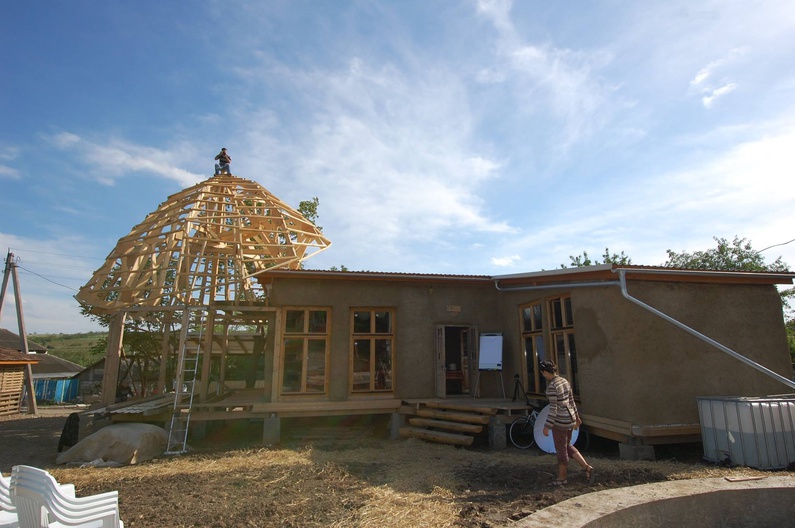 By the end of last year they managed to build a smaller community house where workshops and trainings can take place, they started to grow their own seeds in the garden and they finished the first house where Liliana and her family is living together with another family. They recently launched a fundraising campaign for building an environmental training centre where up to sixty participants could attend the training sessions.
By the end of last year they managed to build a smaller community house where workshops and trainings can take place, they started to grow their own seeds in the garden and they finished the first house where Liliana and her family is living together with another family. They recently launched a fundraising campaign for building an environmental training centre where up to sixty participants could attend the training sessions.
Eco-Village Moldova is growing as well as the community. In the last year more than one hundred people were involved in their activities including members of EcoVisio team, international volunteers and participants from neighboring villages. ‘Our concept of the community is really broad – explains Liliana – it can be people who share some ideas, some of the principles we believe in, apply some of our methods and practices or willing to exchange resources. We would like to be an open community and we welcome everyone who would like to stay with us, share experiences and ideas and take part in our activities.’ Openness, however, is not enough for creating a welcoming atmosphere and building a naturally evolving community. It should go hand in hand with open-mindedness, flexibility and being adaptive to newcomers and the group of Eco-Village Moldova doing their best in keeping these principles.



